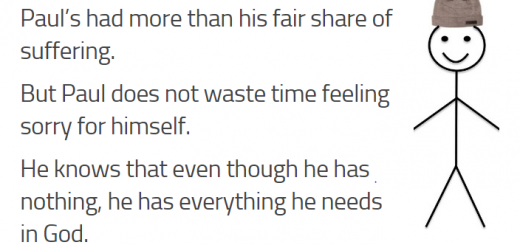Learning from Paul’s Letter to Philemon: the right thing is not often the easy thing
In this personal letter to Philemon, Paul is writing with one clear purpose: to prepare the way for Onesimus to return to Philemon. Everyone involved would have known the back story and known exactly what Paul was talking about. Paul never imagined that we would be studying this letter nearly two thousand years later – I’m imagining he would have filled us in with a bit more of the background if that was his intention. And so we have to read between the lines to see what is going on here and why the early church believed it was important to include this letter in the collection we have come to know as the Bible.
I am sending him—who is my very heart—back to you. I would have liked to keep him with me so that he could take your place in helping me while I am in chains for the gospel. But I did not want to do anything without your consent, so that any favour you do would not seem forced but would be voluntary. Perhaps the reason he was separated from you for a little while was that you might have him back forever— no longer as a slave, but better than a slave, as a dear brother. He is very dear to me but even dearer to you, both as a fellow man and as a brother in the Lord. Philemon 1:12-16
And so this is what I believe we can surmise about Onesimus from this passage:
- he’s a good lad
- he left Philemon’s house – the reason is not clear but it seems that he left without permission
- he is returning to Philemon because Paul is sending him
- Paul loves him dearly
- he’s been helpful to Paul during his imprisonment
- he belongs to Philemon and for that reason, Paul did not feel able to keep him with him
- Paul does not want to twist Philemon’s arm to accept Onesimus back. He does not want to back him into a corner.
- he has the status of a slave
- he has been transformed by Christ
It’s easy to dismiss this letter as entirely cultural and of its time. We all find slavery abhorrent and cannot understand why Paul appears to be upholding this outdated and exploitative practice. And yet within this framework of a culture we don’t understand and are far removed from, there is so much for us to learn, believe me.
And this is what I believe we can learn from this paragraph:
Reconciliation begins with the first step back
We don’t know why Onesimus left Philemon’s house, how he encountered Paul and how his life changed. He’d walked away from the life he had and came across new life. And once he had been transformed by the love of God, the next chapter was to involve turning round and going back.
Going back is so hard. I remember when my husband and I returned to worship at the church we had left after a major falling out 18 months before. Now that was tricky for a long time! Who does that? Who walks back into a situation of conflict to seek reconciliation? Why not just leave it be? Because God is a God of love and reconciliation, that’s why. If we’ve walked away, it may feel like the conflict has been resolved, but it has simply been resolved. Peace is not the absence of conflict, it’s the resolution of conflict. It’s active not avoidant. We are called to be peace-makers, striving for peace.
We cannot control the response of others
Paul has no idea how Philemon will respond. He’s a good man, yes, but he has been wronged by one of his slaves. There’s a procedure for that and who knows what Philemon will feel obliged to do? Paul knows what he wants to do with Onesimus: he wants him to stay right there with him because he’s become an invaluable friend. But he’s not going to pull rank or go for the sympathy vote to get what he wants. He knows the right thing to do and the right thing is not often the easy thing or the preferred thing. He can offer Onesimus no guarantees or assurances about how this is going to turn out for him. All he can do is point the young man in the right direction and trust in the God of reconciliation.
Maybe there’s a reason for all this
Difficult territory, I know, and I’m not about to start asserting to those who are suffering in a broken relationship that everything happens for a reason. But I have observed how in the most terrible of situations, it is possible to see God clearly at work to bring strength and comfort and reconciliation.
In the darkest moments of my life, I have struggled to see a reason and have given up looking for one – but I have seen opportunity, the opportunity to be the person God wants me to be, to bring light and love. It all sounds marvellous, doesn’t it? It’s not – it’s messy and ugly and just awful at times, but God has always been there.
Every human being is equal before God
No rank, no gender, no status, no religion, no tribe: all equal. That’s what Paul says –
There is neither Jew nor Gentile, neither slave nor free, nor is there male and female, for you are all one in Christ Jesus. Galatians 3:28
That’s revolutionary talk right there. Paul was living within a culture where owning slaves was the norm. He was not out to destabilise society and overthrow the laws of the land. But this revolutionary way of treating others and regarding others through the eyes of God was a huge step in the right direction. He saw Onesimus as a fellow believer, loved him as such, and hoped that Philemon would do the same. In society, everyone had their role to play, but how they played it and how they treated others was key.
We may believe we’re past all that, that slavery is long gone, bu modern slavery is still a thing, a horrific thing. And anyway, how many times have we looked through someone, not treated someone with respect, not shown compassion because of someone’s role or appearance? It happens.
See the human being in every individual. Even more than that, see the light of God at work in every individual.
That’s the challenge.
We’re not done with Philemon and Onesimus, but that’s plenty to think about for one day, don’t you agree?












